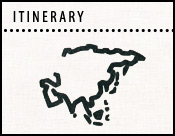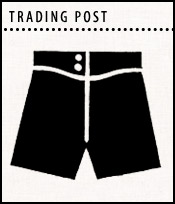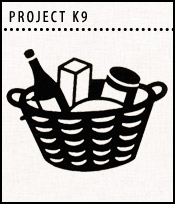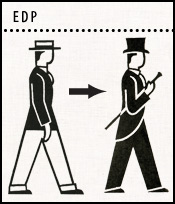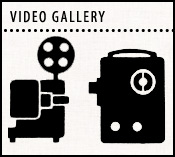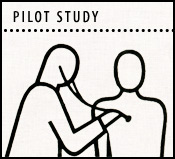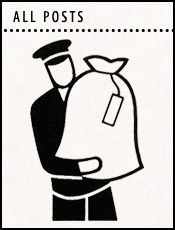I was suddenly jostled awake by a firm hand on my shoulder. It was the driver of our bus from Amman to Damascus, shaking me. He dared not touch Claudia, sitting next to me, and after I was awake to some degree, he indicated that I should wake her too. In fact, it turned out, men and women were not even technically allowed to sit next to each other on this bus, and we had been inadvertently perpetrating another Gaijin Smash.
Regardless, I woke Claudia, and, in a somewhat addled state, wandered off the bus and out into Syria. It was pitch black, cool and dry outside. I looked at my watch. It was just a little after three in the morning. The bus driver had removed our bags and bikes from the belly of the bus, and they lay on the road in a puddle of streetlight. And with a rev and a squeak of the suspension, the bus was gone.
We were soon approached by a small gang of young men, who emerged from the shadowy alleyways of this highway side in Damascus, shouting about taxis. When we began to show them our bicycles and unfold them, indicating our intention to wheel into town, they began to giggle and switched from selling mode into inquisition mode.
Soon we were in the midst of an uncomfortable conversation, in which lines of communication were fraying and the topics included the war in Iraq, Barak Obama, and Obama’s relative comparison to George Bush. Here, in the middle of the night in Damascus, left on the side of a nondescript highway by a grouchy bus driver, being harassed by random cab drivers, you might think, dear reader, that we were a little on edge.
Drastically the opposite. For one reason or another, we were calm, cool, and collected.  In fact, we were feeling quite positive about being in Syria. We strapped our belongings down, climbed onto the bikes and headed out, calling out our goodbyes as we rode, though the gang of men yelled at us to stay for more parlor talk.
The road on which we traveled had been recently paved in a most absurd way, with giant piles of asphalt in some places, and huge rounded, deliberate looking potholes in others. To make matters worse, many of these obstacles were hiding in the shadows, and occasionally cars would whip by us at startling speeds, careening through the night.
Despite all this, we were in very high spirits, singing as we rode, “She’s a Lady, Oh Oh Oh, She’s a Lady!†and generally feeling good. At a large roundabout, we stopped to ask a man wandering the streets which way into the city center, but he turned out to be either very drunk, or on some other kind of drugs. Luckily, another, also slightly inebriated chap emerged out of the night, and directed us to ride subversively across a bridge toward a cluster of Gothic looking buildings.
And then we were there. It was the center of Damascus, and it was beautiful. Most of the buildings had a very old world imperial look to them, with ornate decorations, and good number of spire-like attachments. The city was also quite clean, and smelled faintly of roasting nuts. It was great to have arrived in such a comfortable and interesting place. Unfortunately, it was now about four in the morning, so we had a few choices to make. In the end, we decided that we might was well take this one all the way to Brooklyn and just stay up all night.
So we headed over to a nearby 24-hour hookah and tea café, parked our bikes outside, and to the great chagrin of all involved headed in.

“This is definitely a place where women are not normally allowed,†Claudia mentioned as we all sat down. It was true, the clientele were all men, sitting at little square felt tables, smoking hookah, playing cards and drinking little cups of sweet tea. The staff was all smiles, as were our fellow clientele, who seemed quite interested and amused by the foreigners who came out of the night on folding bicycles.
I left Scott and Claudia there to head out in search of an ATM. I found a few of them, but none appeared to support my American MasterCard. So I returned to the café empty handed. By that point, it had been ascertained that the staff was willing to accept Jordanian Dinars, so knowing that we could pay our bill, we simply relaxed into our seats, dealt the whist, and let the morning work its way around.
In Syria they use mostly a local “Arabic†system of numbers, which is coincidentally actually the Indian system of numbers, while the ones they use in India (and the U.S.) are Arabic numerals. Regardless, we needed to learn to read the new style of numbers, so Claudia, as our West Asia Cultural Liaison, insisted that we keep track of the whist in Indian numerals.
Amidst the multilingual calculus, a young man at the neighboring table leaned over and began chatting with Scott.  Clean shaven but firm, he introduced himself as Hosam.  As his friends chuckled over the smoke of hookah and the slapping of playing cards, Hosam introduced himself as a friend in the unfamiliar city of Damascus.  Son of a local sign maker, and employee of the Yellow Pages, this enterprising chap plied the market for advertising and promotion.  Exchanging phone numbers with Scott, he leaned back into his chair and carried on with his cronies, periodically bouncing his watchful eye back to our table.

As we folded up a game of three-person whist, another fellow came over to our table to take a look at my deck of M&Ms branded playing cards. He seemed to approve. We were soon to discover that Syria was perhaps the only country on the trip thus far where popular Mars products like Snickers and M&Ms were hard to find. We decided to take the opportunity to ask him if he knew of a cheap hotel around here. In fact he did, and since the sun was now beginning to spill over Damascus, we decided to take him up on the recommendation.

We paid our bill, which, in spite of the high exchange rate between the Syrian Pound and the Jordanian Dinar, was still quite affordable. Back on the cycles, we found the city to be even more beautiful in the daylight than it had been at night. It was so much cleaner than the cities in Jordan had been, and the buildings were a delightful mix of the very new and very old. This should have come as no surprise, since Damascus was in fact the oldest city we would visit on the entire trip, having been continually occupied since about 2000 BCE.

Before riding too far from the 24-hour cafe, we were stopped by a group of Iranian tourists. They were mostly women, dressed all in black, toting fancy DSLRs and video cameras.

They were especially interested in Claudia, though being Persian language speakers, her Arabic did little to help us communicate with them. We were soon to learn that Syria is just packed with Iranian tourists since most of the Shia Muslim pilgrimage sites are to be found in Syria.
We continued to wheel on, ostensibly looking for the hotel, but mostly just loving Damascus.

Eventually, with a little help from a few pedestrians, we found the Hotel Ziad Al Kabir. The place turned out to be a Sudanese flophouse of sorts. It was nestled on the third floor of a very old building, mostly full of tailor shops and printers.

The hotel consisted of a central lobby for reception and prayer, followed by a long, high ceilinged hall, lined with cracked wood and sanded glass doors, leading into similarly high ceilinged and crumbling rooms, outfitted with ratty steel framed beds cradling thin aging mattresses.

A small kitchen emitted the tantalizing smell of caramelizing onions and Sudanese spices. Our fellow lodgers were mostly from Sudan, and milled around the premises in flowing robes, and tending to their magnificent mustaches. The owners were all smiles and spoke bits and pieces of English.

Perhaps it was an increased romanticism induced by the lack of sleep, but we instantly fell in love with the place, especially Claudia. They claimed a fixed rate of $4.00 per person, and by then we had fallen in love with the delightfully grimy vibe of the place. So we booked a few nights.

We headed to the rooms, and flopped down onto the beds, trusting they would be clean enough to prevent any skin infections, and pondered napping.

In the end, however, with the sun shining and Damascus calling, we decided we had better head out on wheels.

Breakfast would be key. It had been some time since we had eaten anything. Luckily the city seemed full of delicious looking food. We ended up stopping at a flatbread joint, where one could select from a variety of pizza-esque flatbreads.

We were still in need of an ATM that would work with our foreign cards, but the fellow here too, seemed happy to accept Jordanian Dinars, albeit at a somewhat slanted rate. The flatbread, which might be best compared to Turkish “pide†was delightful, and the plastic chairs outside the place, were just operational enough to provide us with a place to sit and eat.  In search of a refreshing diet cola for the team, Scott headed out on a mission while we waited for the oven to warm.  In the process, he found himself in the thick of a pilgrimage troop, all haggling on the street for Chinese made garments and houseware goods.

One man even posed for a photo with his Polaroid 600 SE.  A true devotee: to the camera, to the mustache, and no doubt to the pilgramage.

So with food in our stomachs, we headed out, continuing to wheel, passing giant 1970s-looking brutalist Islamic architecture and thousand-year-old stone bath houses.

Suddenly we found ourselves in a giant outdoor used goods market, where all kinds of bizarre products were for sale.

We dismounted to walk through the area, investigating everything from old appliances, watches, and books, to wired telephones and other 1980s technologies.


Outside the market, we finally found an ATM (probably our 7th or 8th attempt) that accepted our foreign MasterCards. Now we had some Syrian pounds in our pockets and my goodness were they beautiful.

From there, we wheeled on, continuing to soak in this delightful town, riding past fountains and mosques, down palm tree lined streets, and impressive government buildings. We stopped for a snack at one of the many Arabic sweet shops, where we were able to load up a plate with baklava and other similarly honey-and-nut-based pastries for only a couple of dollars.

Our next goal would be to repair Scott’s Sri Lankan sandals again. The fellows in Amman had done a decent job, but the rigors of hiking through Petra had managed to tear the new stitches out. We headed into the “old city†part of Damascus to find a shoe repair shop.

The old city of Damascus is quite the hectic place, with plenty of traffic whipping around with little regard for lanes and general protocol. The streets become narrow, and pedestrian traffic intensifies. Meanwhile, the concentration of little shops selling all kinds of amazing foods and goods spikes, as does the number of people burning things, cooking in the street, yelling, making noise, carrying swords, welding in public and generally getting Syrious.

While we were wandering around, we were approached by a local chap, with a quite enviable mustache, who offered to help us get our bearings in this new and complex neighborhood. He even offered also to help us haggle with a shoe repair man to get Scott’s sandals fixed.

For the price of about $1.00, we got a full repair to both sandals, with very thick white thread, going over the ripped seams multiple times. From there, the same chap who had helped us before began insisting that we wander with him into a giant covered market, which he assured us was unmissable. We wandered for a while inside, but finding it too crowded to safely wheel, we explained to him that we would need to revisit the spot on foot in order to properly experience it. He thanked us for letting him guide us around, and we thanked him for his kind help, bidding fond farewells. Syrian people were proving to be absolutely sweet as pie.
From there we proceeded to get hopelessly lost on the tiny and interwoven streets of Damascus’s old city. It was truly a glorious wheel. We must have passed by hundreds of structures which were over a thousand years old, many of which were covered with intricate tiling or hammered bronze accents.

Mosques, bathhouses, shops, homes… they were all so delightfully intricate and unique, yet somehow all of a cohesive overall style. Damascus was such an esthetically pleasing and intellectually tantalizing town.
Another thing that we were noticing was the pharmacy signs. Rather than the standard western move of the cross, or the mortar and pestle with “Rx†on it,  the pharmacists use this fantastic serpent looking into a goblet.

The cars in Damascus were also incredible. The streets were filled with the full spectrum, from brand new BMW SUVs to Ladas, to 1950s retro sedans, to cars that seemed to be frankensteined together from pieces of 2 or 3 different original machines.

The drivers were generally friendly, yielding space to the cycles, and due to the sheer number of cars on the roads, the speed, in the city at least, was generally slow. It was amazing traffic to be part of.

We continued to wheel, back through the covered market, which this time had cooled just enough to allow the cautious wheeler to make it through at slow speeds. It was about then that we realized it was high time to eat again.

We ended up selecting a rather posh Syrian Colonial style restaurant, tucked into an old building. The food was incredible, and not too expensive, at least by the standards of what we’d been paying in Jordan. We dug heartily into a giant fatush, an array of pastes and yoghurts, and some egg-roll-esque cylinders, filled with an oily and salty Syrian cheese blend.


Back on the streets, we kept wheeling, calling waypoints from time to time to investigate all kinds of interesting items that were for sale or attached to the surfaces all around us.
Not far outside the city, we stopped at a bike shop to buy Claudia a new bike bell. Hers had broken at some point during our transit from Amman. The new one we got her was a fantastic Chinese bell, with a deep rich tone, and amazing packaging.

Now armed with a new loud bell, we wheeled on, past hundreds of pictures of the Syrian president posed in all kinds of situations: as soldier, fighter pilot, statesman, or generally keeping it real with the heads of Iran and Lebanon.
We had been going for a while now, but the sun was still high it the sky. Was it time for a nap? Perhaps, but AsiaWheeling generally forsakes midday napping for midday coffee drinking. So we headed out in search of coffee. When we stopped to ask a fellow wheeler where we might find a cup, he said he knew a good place, and asked us to follow him there.
So we did, wheeling behind him through increasingly tiny alleyways, and eventually to the door of what turned out to be his own shop. The shop consisted of a small central room, with a couch, two chairs, a table with three telephones on it, and a glass cupboard full of examples of the types of hammered pots and pans, which it appeared he sold wholesale. The other room of the turned out to be a kitchen, when his wife burst out of it, with the first pot of coffee.
We were to be his guests, it seemed. He asked his wife to get started on the second pot of coffee, and, while we dug into the first, began to converse with us in Arabic. Claudia did a fantastic job of playing translator. The coffee was glorious: thick and black, just barely sweet, with cardamom pods floating in it. The man’s wife was also quite friendly, though she was asked to stay in the kitchen most of the time and was not invited to participate in the group photo.  A shame indeed, as she may well have been the least awkward character in the snap.

After spending what we felt was a respectable amount of time chatting and drinking pots of coffee with this man, we climbed back on the bikes and headed onto the road once again, riding past a giant street of watermelon sellers, which led us far from the old city out to the newer housing developments.

We eventually had wheeled out into the semi-agricultural suburban lands that surround Damascus. Many of these suburban Syrians seemed to have pretty large plots of land on which they grew fruits and vegetables, which we found quite impressive.

Many of the suburbs of Damascus are positioned in the foothills of the Ante-Lebanon mountains, which flank the city. So it was into these foothills that we rode, stopping after a particularly intense climb to try some of that amazing Syrian ice cream, which our dear Mr. Fu had so often raved about.

The ice cream was indeed fantastic, as was the graffiti on the buildings around where it was sold. Fueled by coffee and ice cream, we headed deeper into the foothills, calling a waypoint at this Islamic cemetery.

Up and up we went, higher into the Ante-Lebanese mountains. Soon the city of Damascus spilled out beneath us, and the sun began to sink low.

At this point, Scott decided to head back to the Hotel, but Claudia and I decided to keep wheeling on in search of a sunset view of the city.
We headed up a somewhat crumbling and rather empty side street. We were making very good progress getting up the mountain, and were just about to approach the perfect viewing spot, when a group of three Syrian military men began yelling, and running towards us. It appears we had accidentally taken the access road to a Syrian military base. In fact, we learned from the soldiers, the entire top of this hill was a base, so all spots that might have a view of the city were actually off-limits.
Fair enough, we thought, and wheeled back down the mountain to meet up with Scott.




















































































































































































